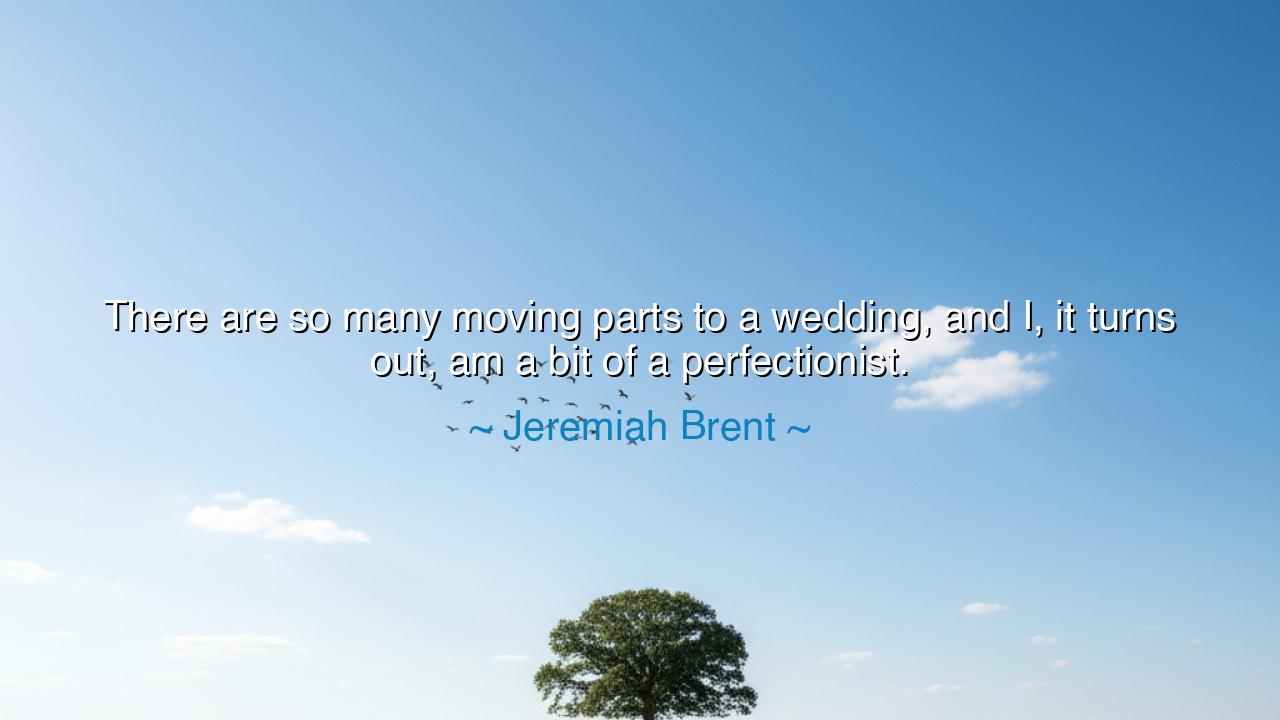
There are so many moving parts to a wedding, and I, it turns
There are so many moving parts to a wedding, and I, it turns out, am a bit of a perfectionist.






Jeremiah Brent, with honesty and self-awareness, declared: “There are so many moving parts to a wedding, and I, it turns out, am a bit of a perfectionist.” In these words lies the recognition that love’s celebration is not simple, but a tapestry woven of countless threads — the details of place, of dress, of music, of ritual. And within this great weaving, the soul that seeks order may find itself consumed by the desire for harmony, beauty, and flawlessness.
The ancients knew this struggle well. To arrange a feast, to consecrate a union, to host a festival was never a task of simplicity. Every moving part — from the food upon the tables to the words spoken in blessing — carried weight. A misstep in ritual could mean insult to family, or even offense to the gods. Thus, the longing for perfection is not new, but an echo of humanity’s eternal desire to honor sacred moments without blemish.
History gives us the tale of Catherine de’ Medici, whose wedding to Henry II of France was a spectacle of grandeur. Every element — from banquets to masques to processions — was orchestrated to perfection, for it was not merely a union of two lovers, but of dynasties. Yet even amid such precision, chaos arose: whispers of scandal, burdens of cost, and political tension that no perfection could silence. In this, as in Brent’s confession, we see the truth — that even when every detail is arranged, life’s unpredictability humbles us.
Brent’s words also reveal the human heart’s paradox. The perfectionist yearns to control the uncontrollable, to tame the vast and untamable nature of love’s celebration. Yet, often, it is the imperfections — a stumble in the vows, a tear in the voice, a laugh amid silence — that become the most cherished memories. The moving parts may never align perfectly, but their very unpredictability brings authenticity.
Let the generations remember: a wedding is not made holy by perfection, but by sincerity. The countless details may dazzle, but they are only vessels for the deeper truth — the joining of two souls in covenant. As Jeremiah Brent teaches, it is natural to strive for harmony, but one must not forget that even amidst imperfection, love itself shines brighter than any flawless design. For in the end, it is not the moving parts but the enduring bond that matters most.






GDGold D.dragon
I can totally understand why Jeremiah Brent feels like a perfectionist when planning a wedding—there’s so much at stake! The attention to detail is important, but I also wonder if it’s possible to get so caught up in the little things that we miss the bigger meaning behind the event. Do you think weddings would be more enjoyable if people took the pressure off themselves and focused more on the love and joy of the day?
HHN
Weddings are stressful enough without adding perfectionism into the mix. Jeremiah Brent’s insight into the process of planning and the challenge of balancing perfection with reality is really relatable. Do you think society places too much importance on having a ‘perfect’ wedding, leading to unnecessary pressure? Maybe we need to rethink what it means to have a successful wedding—perhaps it’s about the experience, not the perfection.
VHNguyen Trung Viet Huy
It’s understandable that Jeremiah Brent would feel the pressure of perfectionism when planning a wedding, especially since so many details go into making the day just right. But I wonder, does perfectionism in wedding planning really translate to happiness for the couple? Maybe the real challenge is knowing when to let go and embrace the imperfections that make the day memorable. What do you think—can weddings still be beautiful without everything being flawless?
DCPhan Dang Cuong
Jeremiah Brent's comment about being a perfectionist in wedding planning makes me think about the fine line between striving for perfection and losing sight of the bigger picture. Weddings are meant to be a celebration, but the stress of wanting everything just right can overshadow the joy. How do you think perfectionism affects a person’s ability to enjoy their own wedding day, especially when they’re responsible for all the details?
Llamhoangan
I really get where Jeremiah Brent is coming from. Weddings are such a big event with so many details to manage, and perfectionism can make those details feel even more overwhelming. How does someone balance wanting everything to be perfect while also maintaining some sense of calm and flexibility during such a stressful time? Is it possible to let go of some control and still have a successful wedding?